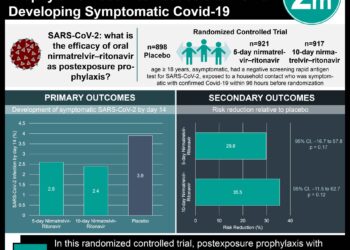#VisualAbstract: Hydroxychloroquine not effective for preventing COVID-19 after contact exposure
1. Postexposure hydroxychloroquine therapy did not prevent coronavirus disease 2019 (Covid-19) infection in exposed healthy individuals.
2. Hydroxychloroquine treatment after exposure to a positive case patient was shown not to reduce severe acute respiratory syndrome coronavirus 2 (SARS-CoV-2) infection incidence in exposed individuals.
Evidence Rating Level: 1 (Excellent)
Study Rundown: As coronavirus disease 2019 (Covid-19) continues to cause a public health crisis, a multitude of measures are being pursued to mitigate the outbreak. Along with hand hygiene, face mask, social distancing, and quarantining to slow disease spread, postexposure prophylactic treatment of health individuals is a potential method to control the outbreak. Currently, no therapy is established to be effective in prophylactically preventing Covid-19; however, two aminoquinolines – hydroxychloroquine and chloroquine – are potential treatments. Both therapies have shown antiviral activity through in vitro experimentation. As such, this study investigated the efficacy and safety of hydroxychloroquine in preventing secondary polymerase chain reaction (PCR)-confirmed, symptomatic Covid-19 in exposed individuals. The study determined postexposure hydroxychloroquine treatment was not able to prevent symptomatic Covid-19 infections. The randomized control trial was limited by the trial design. The signing of informed consent occurred after randomization, after which, assignments were revealed to the participants. Though participation or lack thereof was not attributed to this method, the use of cluster randomization may have biased study enrollment. Nonetheless, this study’s results are significant, and its findings highlight the ineffectiveness of a treatment potentially used to reduce Covid-19 infection development.
Click to read the study in NEJM
Relevant Reading: A randomized trial of hydroxychloroquine as postexposure prophylaxis for Covid-19
In-Depth [ randomized controlled trial]: This randomized controlled trial enrolled 2,314 participants from three of nine health administrative regions in Catalonia, Spain. Participants included in the study were ≥ 18 years of age, asymptomatic, and had a recent close-contact Covid-19 exposure to a PCR-confirmed case patient. Participants who had Covid-19-like symptoms during the two weeks before enrollment were excluded from this study. The participants were randomized in a 1:1 ratio to receive hydroxychloroquine or usual care, respectively. The primary outcome was the onset of a PCR-confirmed, symptomatic Covid-19 episode. The participants were followed for 14 days. During the follow-up period, 64 of the 1,116 contacts (5.7%) in the hydroxychloroquine group and 74 of 1,198 contacts (6.2%) in the usual care group had a PCR-confirmed, symptomatic Covid-19 episode (risk ratio, 0.86; 95% confidence interval [CI], 0.52 to 1.42). Additionally, median Covid-19 onset from exposure was 8.0 days in both groups (hazard ratio, 1.0; 95% CI, 0.6 to 1.6). From the initial negative result of severe acute respiratory syndrome coronavirus 2 (SARS-CoV-2) infection, there was no significant difference in participants having a positive-PCR result during the study in the hydroxychloroquine group (179 of 958, 18.7%) and the usual care group (185 of 1,042; 17.8%) (risk ratio, 1.03; 95% CI, 0.77 to 1.38). Finally, the most frequent adverse events related to hydroxychloroquine treatment were gastrointestinal, such as diarrhea and nausea, and nervous system, such as drowsiness and headache. Five adverse events of self-limited heart palpitation were reported, which may be attributed to hydroxychloroquine use. Taken together, postexposure hydroxychloroquine therapy was shown not to prevent symptomatic Covid-19 infection or reduce the incidence of SARS-CoV-2 infection.
©2021 2 Minute Medicine, Inc. All rights reserved. No works may be reproduced without expressed written consent from 2 Minute Medicine, Inc. Inquire about licensing here. No article should be construed as medical advice and is not intended as such by the authors or by 2 Minute Medicine, Inc.







